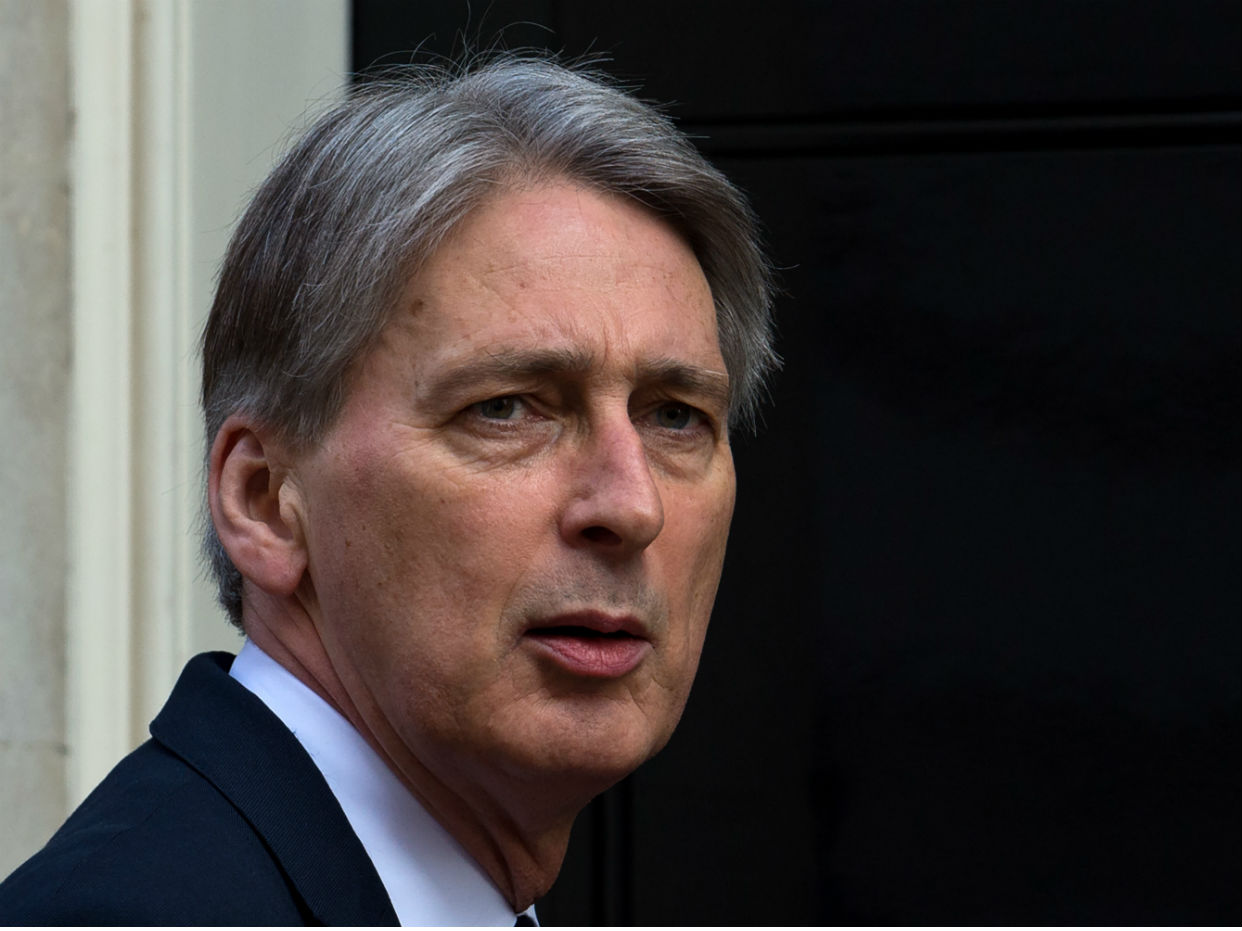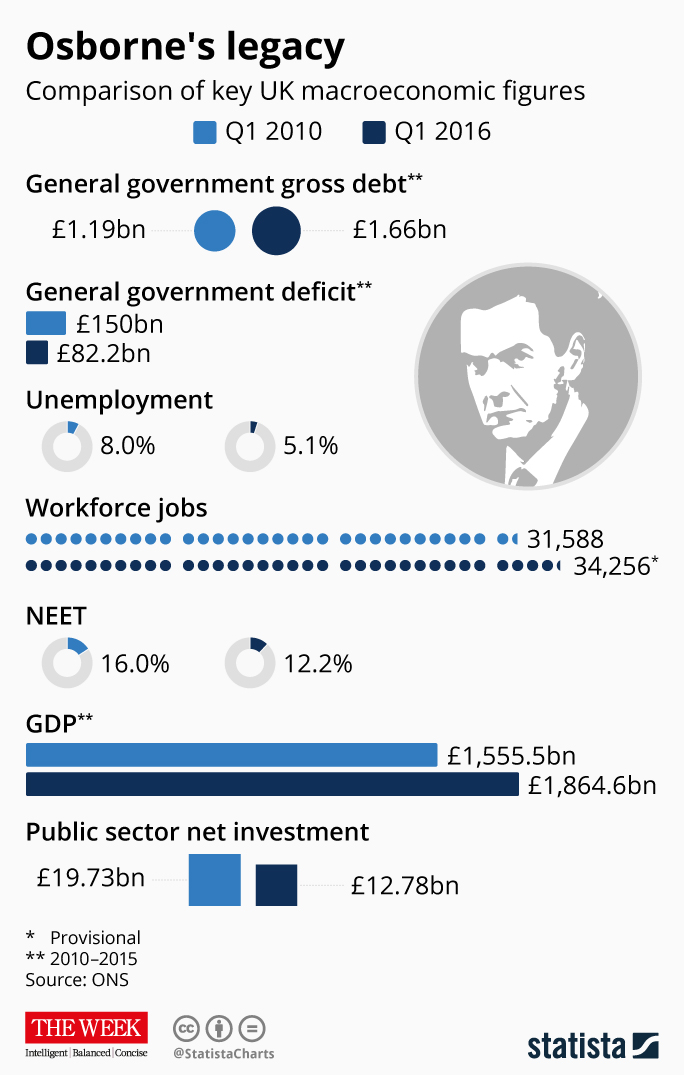What can we expect from Chancellor Hammond?
There's no Brexit budget and austerity will be scaled back, but don't expect much more largesse from the Tories' 'axeman'

A free daily email with the biggest news stories of the day – and the best features from TheWeek.com
You are now subscribed
Your newsletter sign-up was successful
A political era came to an end last night, when George Osborne was reportedly "sacked" as chancellor and replaced by Philip Hammond.
The move signals a departure from the policies Osborne pursued with David Cameron over the past 11 years at the top of the Conservative Party and six years in government.
So what can we expect from former defence, transport and foreign secretary now sitting behind the wheel of the UK economy?
The Week
Escape your echo chamber. Get the facts behind the news, plus analysis from multiple perspectives.

Sign up for The Week's Free Newsletters
From our morning news briefing to a weekly Good News Newsletter, get the best of The Week delivered directly to your inbox.
From our morning news briefing to a weekly Good News Newsletter, get the best of The Week delivered directly to your inbox.
The first order of business is what we will not get: an emergency budget this summer.
Before the EU referendum, Osborne warned a vote for Brexit would lead to tax increases and further cuts to tackle an alleged £30bn "black hole" in the economy.
Although this pledge was later reversed, during his first interview on the BBC's Today programme this morning, Hammond was asked whether he planned to bring out the red briefcase in the coming weeks.
He would not, he replied. Instead, the new Chancellor will "take the summer to review with Mr Carney [Bank of England governor Mark] how to tackle the 'chilling effect' of the Brexit vote on the economy, after fears in the Treasury that the economy could tip into recession", says the Financial Times.
A free daily email with the biggest news stories of the day – and the best features from TheWeek.com
An autumn statement will follow as planned in November or December.
In terms of actual policies, Hammond "signalled a scaling back of austerity", in line with his new boss's vow to scrap a pledge to return the public finances to surplus by 2020. He said the economy was in a "new phase" and that "reassurance" was needed.
Despite talk of a new industrial policy and investment in neglected UK cities, longer-term it would not be wise to expect continued largesse.
Hammond is known as a fiscal hawk who, The Independent says, was known as the Tories' public-spending "axeman" during his time in the shadow cabinet and who presided over big cuts to the Ministry of Defence budget.
On Europe, he has already stated the UK will not seek to remain a member of the single market, ruling out a Norway-style arrangement within the European Economic Area.
But he would like to see "access to the single market for Britain's businesses", he added, indicating a Switzerland-style bilateral arrangement that would still require compromise on free movement laws.

Infographic by www.statista.com for The Week UK
Theresa May on business: 'Ed Miliband meets Margaret Thatcher'
12 July
Theresa May went from Conservative leadership contender to prime minister-in-waiting yesterday after rival Andrea Leadsom dropped out before the race to secure the vote of the party's wider membership truly got started.
However, it did not come before May set out her own pitch on the economy and business, promising a "different kind of Conservatism".
Under the slogan: "A country that works for everyone, not just for the privileged few", the Home Secretary set out a vision for the economy that BBC economic editor Kamal Ahmed describes as being a marriage of "Ed Miliband and Margaret Thatcher".
In 2011, Miliband, who led his party to a resounding defeat at the 2015 general election, said he was going to rein in excessive executive pay, telling the BBC's Today programme interview that his was "not an anti-business message, [but] an anti-business as usual message".
Yesterday, May also pledged to curb excessive boardroom pay and to tackle inequality between executives and their workers. Even her language sounded similar: "It is not anti-business to suggest that big business needs to change," she said.
Among her policies are proposals for large company boards to have workers' representatives, for shareholder votes on excessive pay to be legally binding and for new laws to allow the government to prevent predatory takeovers of British companies.
While there has been some backing for the ideas, among businesses, there has been an initially "lukewarm reaction" especially to the boards shake-up, says The Guardian.
Joe Kaeser, the chief executive of Siemens, whose supervisory board consists of 50 per cent employee representatives, said: "[If] you have workers' representatives that are hypothetically from the UK, they also need to act in the best interests of the company if [the issue] is about job cuts in the UK and creating new jobs in China because demand has shifted."
JD Wetherspoon founder Tim Martin added: “Instinctively, yes, [it could work] as long as it doesn't become a muddle… What hasn't worked in France [where they have employee representatives on boards] is… making the system too employer unfriendly."
As for Lady Thatcher, Ahmed says the Iron Lady's famous opposition to big state in favour of communities of people was reprised in the line from May's speech: "We don't just believe in markets, but in communities."
May implied criticism of George Osborne's tenure at the Treasury, notes the Financial Times, for "neglecting productivity problems" and failing to spread prosperity beyond London and Manchester.
So, she has pledged to reverse the austerity principle for the coming five years as the country grapples with Brexit negotiations - and yesterday, she promised a "proper industrial strategy" to rejuvenate all of the UK's great cities.
As for European trade, that scarcely got a mention, except to say: "Brexit means Brexit" and that there would be no continued membership "through the back door".
In practice, that does not rule out access to the single market, something May said last month would be a "priority". The problem will come in marrying this with her comments that there will be no deal "that involves accepting the free movement of people as it has worked hitherto".
-
 Gwen John: Strange Beauties – a ‘superb’ retrospective
Gwen John: Strange Beauties – a ‘superb’ retrospectiveThe Week Recommends ‘Daunting’ show at the National Museum Cardiff plunges viewers into the Welsh artist’s ‘spiritual, austere existence’
-
 Should the EU and UK join Trump’s board of peace?
Should the EU and UK join Trump’s board of peace?Today's Big Question After rushing to praise the initiative European leaders are now alarmed
-
 Antonia Romeo and Whitehall’s women problem
Antonia Romeo and Whitehall’s women problemThe Explainer Before her appointment as cabinet secretary, commentators said hostile briefings and vetting concerns were evidence of ‘sexist, misogynistic culture’ in No. 10
-
 Labour shortages: the ‘most urgent problem’ facing the UK economy right now
Labour shortages: the ‘most urgent problem’ facing the UK economy right nowSpeed Read Britain is currently in the grip of an ‘employment crisis’
-
 Will the energy war hurt Europe more than Russia?
Will the energy war hurt Europe more than Russia?Speed Read European Commission proposes a total ban on Russian oil
-
 Will Elon Musk manage to take over Twitter?
Will Elon Musk manage to take over Twitter?Speed Read The world’s richest man has launched a hostile takeover bid worth $43bn
-
 Shoppers urged not to buy into dodgy Black Friday deals
Shoppers urged not to buy into dodgy Black Friday dealsSpeed Read Consumer watchdog says better prices can be had on most of the so-called bargain offers
-
 Ryanair: readying for departure from London
Ryanair: readying for departure from LondonSpeed Read Plans to delist Ryanair from the London Stock Exchange could spell ‘another blow’ to the ‘dwindling’ London market
-
 Out of fashion: Asos ‘curse’ has struck again
Out of fashion: Asos ‘curse’ has struck againSpeed Read Share price tumbles following the departure of CEO Nick Beighton
-
 Universal Music’s blockbuster listing: don’t stop me now…
Universal Music’s blockbuster listing: don’t stop me now…Speed Read Investors are betting heavily that the ‘boom in music streaming’, which has transformed Universal’s fortunes, ‘still has a long way to go’
-
 EasyJet/Wizz: battle for air supremacy
EasyJet/Wizz: battle for air supremacySpeed Read ‘Wizz’s cheeky takeover bid will have come as a blow to the corporate ego’